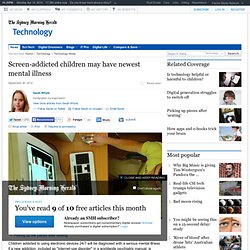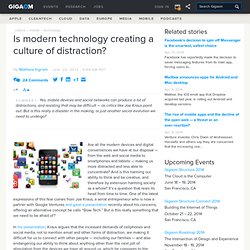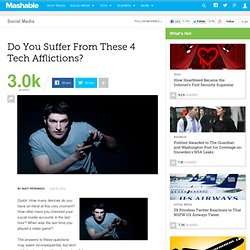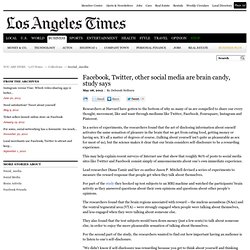

Screen-addicted children may have newest mental illness. Children reliant on electronic devices could develop "internet-use disorder".

Multi-screen mania: how our devices work together. The reality of our multi-screen world is that consumers are increasingly turning to different devices throughout the day to accomplish tasks.

A user might rely on a smartphone to dash off a quick text message or to scan a product in store, then use a tablet to plan trips at home and then turn to a PC to do more heavy research. But we’re not just tackling discrete jobs with each device. We’re spreading out tasks between devices, starting something on one screen and then completing the task on another machine. Psychology Of Social Networking [INFOGRAPHIC] Many colleges are concerned about providing enough bandwidth to students. Brits with mobiles now text more than talk. Without Social Media, 18% Of Teens Would 'Stop Communicating' 18% of teens would stop communicating altogether if their favorite social networks shut down. That’s according to a recent survey of American high school and college students by email marketing company AWeber. According to the survey, 90% of teens are on Facebook, and an astounding 93% of teenagers use mobile phones -– the same amount that use email. 74% of teens are YouTube users, and 47% use Skype to keep up with others.
Facebook and Email own almost equal parts of teens' hearts. With teenagers going for both when they wake up in the morning, while they're in class, and even while they're on vacation. Nearly 9 out of 10 Facebook users keep tabs on their exes. According to a study conducted by a Western University student completing her Masters’ thesis, approximately 88 percent of Facebook users that went through a relationship breakup in the last twelve months use the social network to keep an eye on their ex-boyfriend or ex-girlfriend.
Veronika Lukacs, the student conducting the study, wanted to see how distress caused by the end of a relationship is related to Facebook use. Subjects filled out a survey answering questions about Facebook usage post break-up and Lukacs also conducted interviews with the respondents. When asked about the results of the study which was called “It’s Complicated: Romantic Breakups and Their Aftermath on Facebook”, Lukacs stated “What I found was that whether you were on Facebook all the time or not, your distress level changed based on how much surveillance you were doing (post break-up).” She continued ”The more surveillance there was, the more distress there was, but it’s difficult to say why. Screen Time: How Much is Too Much for Your Kids? We're All Internet Addicts, And We're All Screwed, Says Newsweek. Is modern technology creating a culture of distraction?
Are all the modern devices and digital conveniences we have at our disposal — from the web and social media to smartphones and tablets — making us more distracted and less able to concentrate?

And is this harming our ability to think and be creative, and therefore by extension harming society as a whole? Do You Share Too Much on Social Media? [INFOGRAPHIC] Sharing is the basis of social media, and it can be a beautiful thing.
![Do You Share Too Much on Social Media? [INFOGRAPHIC]](http://cdn.pearltrees.com/s/pic/th/share-social-media-infographic-32673516)
Keeping up with family and friends as kids grow, relationships become marriages and adventures are had — social media can be tons of fun and helps us feel connected to one another. But when does all that sharing become too much? And when can what you share online actually become dangerous? 'Hamlet's BlackBerry': To Surf Or Not To Surf? Do You Suffer From These 4 Tech Afflictions? Quick: How many devices do you have on-hand at this very moment?

How often have you checked your social media accounts in the last hour? When was the last time you played a video game? The answers to these questions may seem inconsequential, but tech addiction is real, and it can have dreadful consequences. According to a January study published in PLoS ONE, a journal of the Public Library of Science, people addicted to the Internet may experience chemical changes in their brains similar to those of alcoholics and other drug addicts.
And that's just the Internet — think about all the other aspects of technology we succumb to every day. Check out the following ailments that you should avoid at all costs. 1. Do you ever reach for your cellphone because you feel it vibrating, only to discover that it hadn't buzzed at all?
'My Last Wish' Is a Social Network Based on Death. A new social network has an interesting premise: connecting people around the world based on what they want to do before they die.

Called My Last Wish, the app encourages users to post wishes on a 'Wish Wall' and then befriend others who might share their dreams. “I believed in the possibility that there can be two persons in this world with same hopes, dreams and wishes,” Kirtan Thaker, co-founder of the White Lotus Corporation, the group behind the app, told Mashable. “I was confident that if we create a app where this possibility can be turned into reality, people will love this concept and they will get a chance to make friends who are unknown but having just one thing in common which is the last wish.” When sharing a wish, users can also choose to attach their email address or phone number so others that share their dream can connect with them. Tapping on a person's contact information within the app will add their information to the contacts list in your phone.
Half Of Americans Think Facebook Is A Passing Fad. Americans Now Spend More Time On Facebook Mobile Than Its Website. All those minutes reading your news feed in bed, messaging friends over lunch, and browsing photos on the bus really add up.

Time spent on Facebook’s mobile site and apps per month (441 minutes) has finally surpassed usage of its classic website (391 minutes) — for Americans who use both Facebook interfaces according to the latest report from comScore. And that’s actually a big problem for the social network. Facebook usually shows four to seven ads per page on its website, but only a few ads per day in its mobile news feed. That means it makes a lot less money when you visit from your little devices. In fact, this week Facebook had to warn potential investors in its IPO that the more people who access it from mobile instead of the web, the worse its business is doing. Study helps explain why we over-share on Facebook, Twitter.
Researchers at Harvard have gotten to the bottom of why so many of us are compelled to share our every thought, movement, like and want through mediums like Twitter, Facebook, Foursquare, Instagram and Pinterest.

In a series of experiments, the researchers found that the act of disclosing information about oneself activates the same sensation of pleasure in the brain that we get from eating food, getting money or having sex. Lots Of Facebook Users Are Idiots, Says Consumer Reports. Is Too Much Tech Bad for the Modern Teenager? [INFOGRAPHIC] Is tech saturation good or bad for the modern teenager?
![Is Too Much Tech Bad for the Modern Teenager? [INFOGRAPHIC]](http://cdn.pearltrees.com/s/pic/th/modern-teenager-infographic-28685009)
Arguments can be made either way, but there's no debating that today's teens are more wired than ever. And digital permeates the lives of young people in general, too. Five ways Facebook can be bad for your mental health. Danah Boyd Warns of Fear in a Networked Society at SXSW - Liz Gannes - Social. Our networked society has a talent for fear-mongering, said Microsoft researcher Danah Boyd in a speech at SXSW Interactive in Austin on Saturday.

Information overload makes us numb, but things that freak us out have a rare ability to break through and capture our attention, Boyd said. As she put it, “The attention economy provides fertile ground for the culture of fear.” Catching A Mood On Facebook. [STUDY] Your Facebook Friends Influence How You Feel. "A cute baby dolphin for your weekend-viewing pleasure" a Facebook friend of mine writes. Under the text, I see a link to an imgur-hosted image of that amazingly adorable marine mammal.
Suddenly, my day is feeling a lot better. Most Adults Go Online for No Particular Reason [STUDY] Americans are going online to pass the time more than they were just a few years ago, according to a new study. Study: Half of UK kids feel ‘sad’ without Internet, while many feel ‘lonely’ The level of emotional dependency on the Internet among Britain’s youth has been revealed by the results of a new study conducted by research firm Intersperience. The results show that those under 12 years of age have a strong emotional connection with the net, with half claiming they would be “sad” without web access, while teens scored even higher, with 60 percent saying they’d also feel “sad”.
The Digital Futures project questioned 1,000 youngsters between 8 and 18 years of age in an attempt to better understand how online and digital technology affects their lives. Forty-eight percent of teens said they’d feel “lonely” without the Internet, which was more than twice the number of under 12s, no doubt reflecting the popularity of social networking sites such as Facebook and Twitter among the older members of the survey group. William Shatner Addresses "Star Trek" Vs. "Star Wars" My Life Without Facebook: A Social Experiment.
Social Media Trumps Driving Among Today's Teens.
Are we on information overload? The last two decades have completely transformed the way we know. Thanks to the rise of the Internet, information is far more accessible than ever before. It’s more connected to other pieces of information and more open to debate. Organizations — and even governmental projects like Data.gov — are putting more previously inaccessible data on the Web than people in the pre-Internet age could possibly have imagined.
Nielsen: U.S. teens exchange 7 text messages per waking hour. Teenage females lead the way, averaging 3,952 messages per month. (Males: 2,815.) Click to enlarge. What happens on the Internet in 60 seconds. Twitter reaches 3 million tweets per day in South Korea. Twitter is finally showing signs of breaking into the mainstream in South Korea, according to new data published by The Chosunilbo. Usage of the service has leapt up with it now seeing 3 million tweets sent each day from an estimated user base of 3.34 million people in the East Asian country. The latter figure is based on data from the Korean Advertisers Association and Media Research organisation, which found that 8.6 percent of 10,000 people it surveyed used the microblogging service at least once a week.
Twitter itself reportedly sees 200 million tweets sent per day across the world, so while 3 million is a small portion of that figure it does show that the service is gaining popularity in Korea despite being an ‘outsider’ in the country’s locally dominated social media space. The service is a hit with young audiences in the country, with over half of all the surveyed users aged between 20 and 40 actively using the service, while none of the 1,195 respondents aged over 60 used it. I want to be connected. But why? Paul Marks, senior technology correspondent. Poll: Over 50 percent of users are worried about Facebook Timeline.
Why People Have Fake Facebook Profiles. It's late afternoon, and you're clicking around on Facebook. Then you stumble upon a person who appears to be Facebook friends with many of your mutual friends. This person is active on Facebook, posting links, videos, images and status updates. Still, something just seems off. Study: Why Facebook is making people sad. The Internet Isn’t Just Another TV Pipe. Editor’s Note: Guest contributor Ben Decker works in corporate strategy at NBCU and does research on new media at NYU. Ben has recently begun an open dialogue around these issues and the future of traditional media. If you’d like to be involved, contact him @BDecker19 As everyone knows, Facebook schooled the web last week, and expanded its territorial ambitions to the world of media. Teens Don't Live in Public on Social Media Sites. Social Media's Slow Slog Into the Ivory Towers of Academia - Josh Sternberg - Technology.
Social Media: The Three Big Myths. We’re bored of social networking. Social Media: Leveraging Opportunity vs. Wasting Time. Social Networking Habits: 54 Percent of Users are Addicted, Webroot Research Finds.